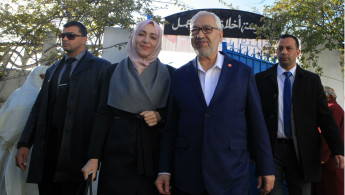Is Ennahdha's house of cards set to tumble?
Following two rounds of voting for president in which Tunisia's moderate Islamist party sat out, and a disappointing showing in the parliamentary election in October, the country has turned its attention to questions surrounding the Ennnahdha leadership.
That focus was particularly sharpened after outgoing president Moncef Marzouki announced his intention to create a Citizens' Movement in an attempt to unite those who voted for him, including Ennahdha supporters.
| The most brutal test a leader faces is when he or she loses the trust of his supporters. |
Even though this new movement's organisational structure is yet to be determined, Ennahdha leaders have been taken aback.
It prompted one of the Ennahdha’s leading figures, Abdelfatah Mourou, to announce that Ennahdha’s supportersare "not for sale".
"Not for sale"
But Marzouki's new project is not the only reason the North African nation’s attention has been drawn to Ennahdha. Tunisia is eager to learn how the party will position itself in the coming phase. It remains the country's second largest party and by not officially supporting Marzouki in presidential elections, the party leardership was clearly hedging its bets on a possible future coalition with president-elect Beji Caid Essebsi and his Nidaa Tounes Party, which holds a majority of seats in parliament.
This gamble has already cost the movement, especially leader Rached al-Ghannouchi. It expedited the resignation of the former secretary general Hamadi al-Jibali, who openly announced that the movement was losing its support just as it had lost the legislative and presidential elections.
Other leading figures are also threatening to resign and launch independent movements. Ennahdha, it seems, is in danger of losing more support than it is gaining and serious doubts have arisen about the leadership’s ability to manage the post-election phase.
Ghannouchi's gamble
Ghannouchi is finding it extremely difficult to convince his supporters that what he is doing serves their interests and that of the movement, particularly in light of the upheaval in Egypt, the strife that is currently consuming Libya, the collapse of the Yemeni state, and the red lines drawn by major powers.
The most brutal test a leader faces is when he loses the trust of his supporters in difficult times. Ennahdha supporters believe that the problem lies in the movement's leadership, and the leader believes that the main problem lies in the unspoken words between him and the majority of his supporters.
Nonetheless, he must explain things to them and restore trust. He must convince them that there were good reasons why the movement did not nominate a presidential candidate from within the party during the presidential elections, and why it did not support Marzouki. He must also reveal why betting on Essebsi serves the general interests of the party, and that it was not for personal gain.
Ennahdha's leadership can continue to ensure that the coming government will be an inclusive national unity alliance that excludes no one. The movement is mainly concerned with refuting calls to isolate and marginalise the Islamist party.
Among those behind such calls are the Popular Front and an active stream within Nidaa Tounes. Ennahdha fears isolation and its leadership is convinced that being part of the next government will make it a partner in power, and at the same time present an obstacle to anyone who attempts to eliminate the gains it made while in power.
Ennahdha's leaders also believe that partnering with Nidaa Tounes will stop those who seek to exclude or eliminate the Islamist movement, as many members believe is planned.
No to power, yes to dignity
However, there are voices within Ennahdha who call on the movement not to participate in the new government, as this would mean that it is giving up the political agenda it adopted after the revolution.
It would also mean that Ennahdha will end up allying with what its supporters consider to be remnants of the old regime. They believe that the best thing Ennahdha could do now is to join the opposition.
Thus, Ennahdha's leadership has little room for manoeuvre. It wants to remain influential despite the change in balance of power in the country, but it also needs to heed the state of its own house .
Ghannouchi wanted to resolve the matter of presidential elections in the first round, but the movement's supporters took it to the second. While Ennahdha's leadership considered Essebsi to be the right man for this phase, the movement's supporters believed that Marzouki could save the revolution.
From this standpoint, organising the movement's 10th general conference seems more urgent than ever , as it could be a defining moment for the future of Ennahdha.
This article is an edited translation from our Arabic edition.



